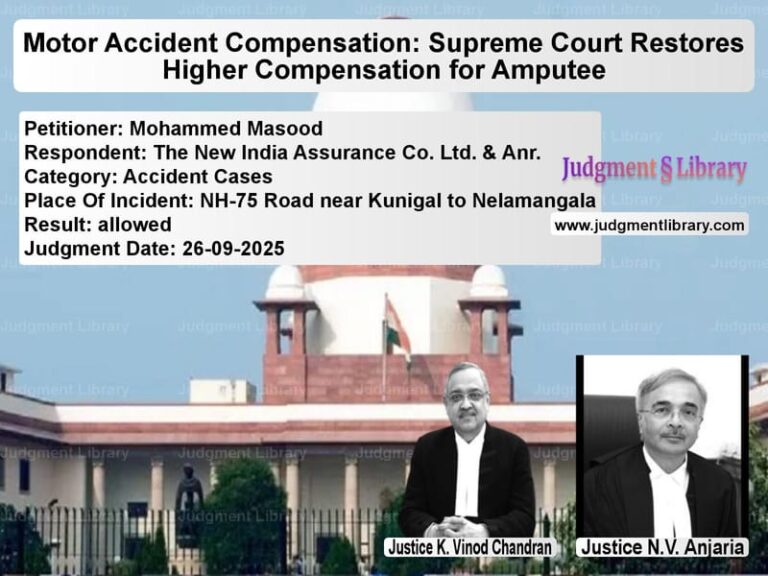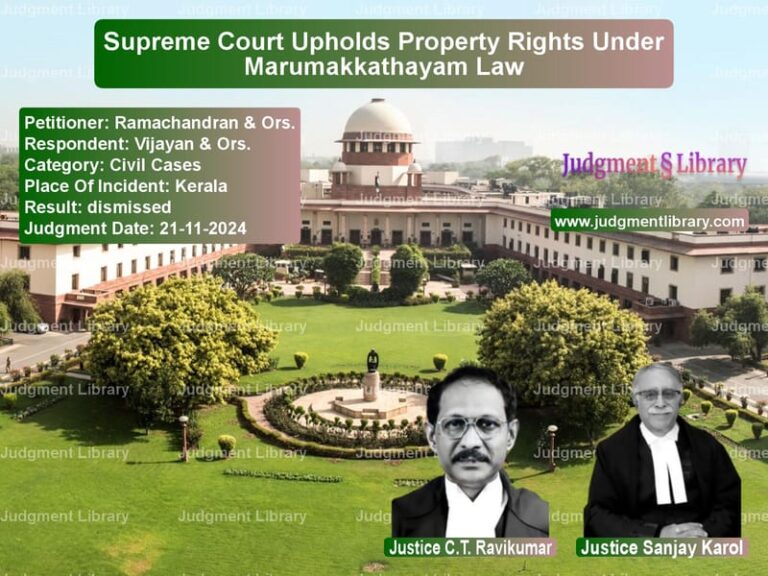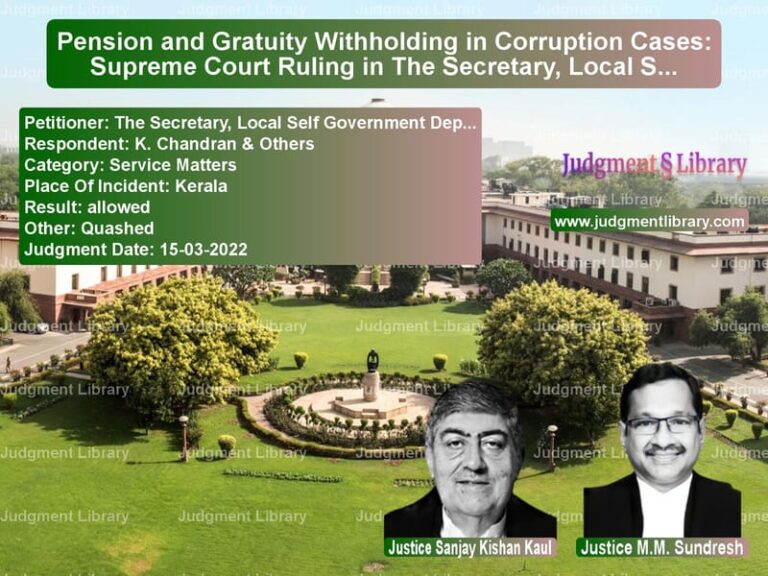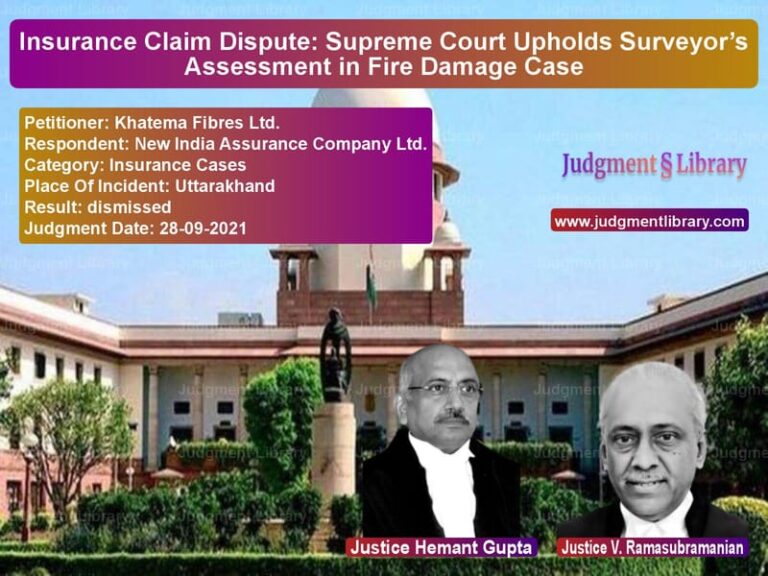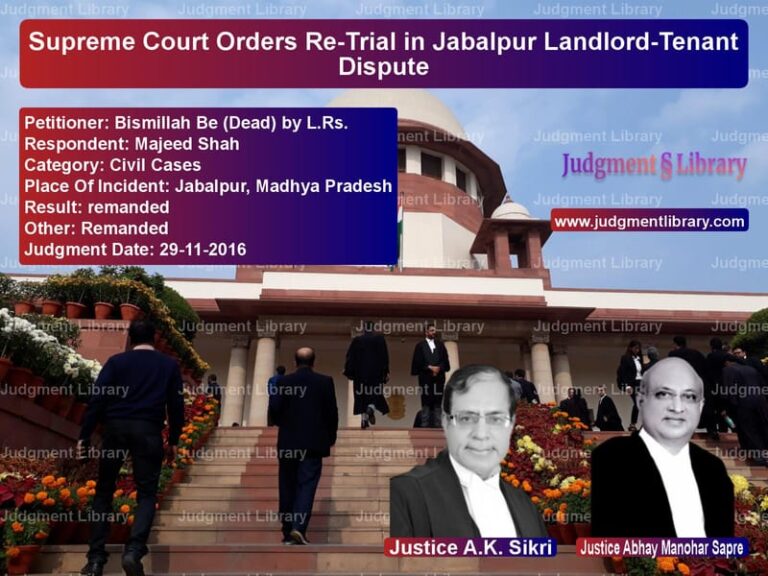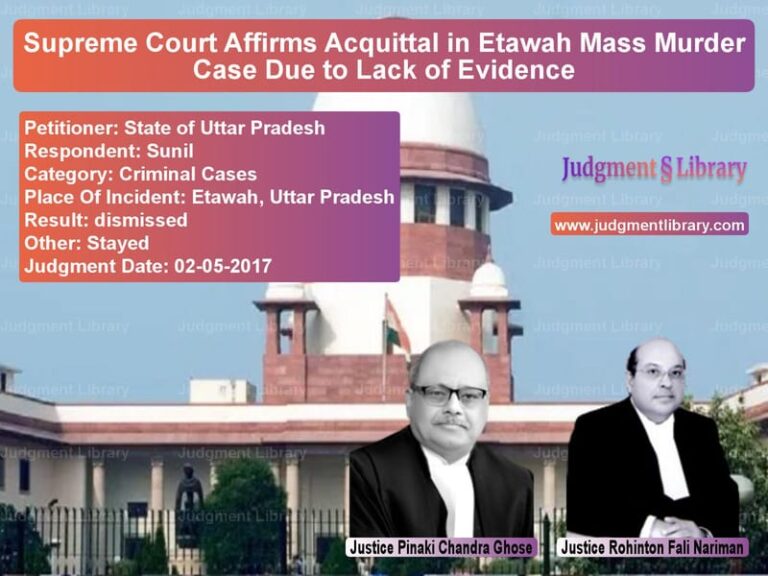Election Petition and the Delay in Providing Reasoned Orders: An Analysis of K. Madan Mohan Rao v. Bheemrao Baswanthrao Patil & Ors.
The case of K. Madan Mohan Rao v. Bheemrao Baswanthrao Patil & Ors. revolves around the delay in the provision of reasoned orders following the pronouncement of a judgment in an election petition case. The appellant, K. Madan Mohan Rao, contested the election results in his appeal against the decision of the High Court of Telangana, which had dismissed his election petition based on an application under Order VII Rule 11 of the Civil Procedure Code (CPC). The delay in providing the reasoned order after the pronouncement of the verdict raised significant concerns, leading to the appellant’s appeal before the Supreme Court. The case sheds light on the importance of providing reasoned judgments and the consequences of failure to do so, particularly in time-sensitive matters like election petitions.
Background of the Case
The appellant, K. Madan Mohan Rao, filed an election petition in the High Court of Telangana challenging the election results and seeking relief under Section 116A of the Representation of the People Act, 1951. The petition was initially contested by the respondent, Bheemrao Baswanthrao Patil, who filed an application under Order VII Rule 11 of the CPC to dismiss the election petition. This application was heard over several dates, and despite the long hearing and the matter being reserved, the High Court pronounced its judgment on 15th June 2022, dismissing the election petition. However, while the oral pronouncement was made, the reasoned judgment was not provided immediately. The appellant approached the Supreme Court, claiming that the failure to provide the reasoned order violated the principles of justice and caused unnecessary delay in resolving the matter.
Petitioner’s Arguments
The appellant, K. Madan Mohan Rao, presented several arguments in support of his case:
- Delay in Providing Reasoned Order: The appellant argued that the delay in providing the reasoned order was detrimental to the fair conduct of proceedings. He pointed out that the High Court had pronounced the result orally on 15th June 2022, but the written reasoned order had not been made available even after several months. The appellant emphasized that the failure to provide the reasons for the decision deprived him of a proper understanding of the High Court’s reasoning and hindered his ability to pursue further legal remedies, such as filing an appeal.
- Violation of Judicial Precedents: The appellant cited precedents such as the case of “Anil Rai v. State of Bihar” and “State of Punjab and Others v. Jagdev Singh Talwandi” to argue that the pronouncement of a final order without a reasoned judgment is against established judicial norms. In particular, the appellant emphasized the observations made by the Court in the Jagdev Singh Talwandi case, where it was stated that serious difficulties arise when High Courts pronounce orders without a reasoned judgment, especially in cases that involve significant decisions like election petitions.
- Failure to Provide Fair Justice: The appellant also argued that the failure to provide the reasoned order after the oral pronouncement violated the principles of fairness and justice. He emphasized that a final judgment without reasons leaves the parties in a state of uncertainty, making it impossible for them to understand the rationale behind the decision or challenge it effectively.
- Implication of Election Petition: The appellant highlighted that the matter involved an election petition, which is a time-sensitive issue. Delays in the process of adjudication can potentially disrupt the democratic process, and in this case, the delay in providing a reasoned order was particularly prejudicial to the appellant, as it affected the timeline for filing appeals and seeking relief.
Respondent’s Arguments
The respondent, Bheemrao Baswanthrao Patil, presented the following counterarguments:
- Absence of Need for Reasoned Judgment: The respondent argued that there was no legal requirement for the High Court to provide a reasoned judgment immediately following the oral pronouncement. They emphasized that oral pronouncements in the presence of the parties were valid, and the failure to provide a reasoned order should not result in the appeal being allowed. The respondent contended that the appellant’s claim about the delay in receiving the reasoned order was without merit, as the parties were informed of the outcome during the oral pronouncement.
- Availability of Appeal Remedy: The respondent also pointed out that even without the reasoned judgment, the appellant had the option to file an appeal. They argued that the availability of a statutory remedy under Section 116A of the Representation of the People Act, 1951, provided an alternative path for the appellant to challenge the High Court’s decision if the need arose.
- Legal Precedents on Reasoned Judgment: The respondent distinguished the case from the precedents cited by the appellant, arguing that those cases involved situations where the failure to provide a reasoned judgment led to a denial of justice. In this case, the respondent emphasized that the appellant had been informed of the result, and the subsequent delay in issuing the reasoned order did not affect the fairness of the process.
- Compliance with Judicial Norms: The respondent also argued that the delay in providing the reasoned order did not violate judicial norms. They emphasized that, in this case, the delay was due to the time taken by the High Court to deliberate on the application under Order VII Rule 11 of the CPC. The respondent maintained that such delays were not uncommon in complex legal matters.
The Court’s Reasoning
The Supreme Court, after reviewing the arguments of both parties, made the following observations:
- Pronouncement of Judgment: The Court noted that oral pronouncements of judgment followed by a reasoned order are not uncommon, but the delay in providing a reasoned judgment after the oral pronouncement raised concerns. The Court emphasized that the delay in providing reasons for the decision undermines the ability of the parties to understand the rationale behind the judgment, which is crucial for the proper exercise of their legal rights.
- Importance of Timely Justice in Election Petitions: The Court recognized the time-sensitive nature of election petitions and noted that the delay in providing a reasoned order in such cases could have significant consequences. The Court emphasized that election petitions should be heard and decided expeditiously to maintain the integrity of the electoral process and ensure timely justice for all parties involved.
- Judicial Precedents on Reasoned Orders: The Court referred to the decision in Jagdev Singh Talwandi’s case and reiterated the need for timely and reasoned judgments in important matters like election petitions. The Court agreed with the appellant’s argument that the delay in providing a reasoned order hindered their ability to understand the decision and seek further legal remedies if necessary.
- Delay in Providing Reasoned Order: The Court concluded that the delay in providing the reasoned order in this case was unacceptable, particularly given the importance of the election petition. The Court held that the lack of a reasoned order for over three months after the oral pronouncement was prejudicial to the appellant’s right to a fair hearing.
- Restoration of the Case for Reconsideration: The Court decided that the matter should be restored for reconsideration of the application under Order VII Rule 11 of the CPC. The Court emphasized that the matter should be treated with the urgency it deserves, particularly in light of the statutory requirements for expeditious proceedings under the Representation of the People Act.
The Court’s Decision
The Supreme Court issued the following orders:
- Setting Aside the Impugned Order: The Court set aside the order passed by the High Court on 15th June 2022, which had allowed the application under Order VII Rule 11 of the CPC, as the reasoned order was not provided to the parties.
- Restoration of the Case: The Court restored the case for reconsideration of the application under Order VII Rule 11 CPC, with the requirement for the High Court to issue a reasoned order promptly.
- Chief Justice’s Intervention: The Court directed that the matter be placed before the Chief Justice of the High Court of Telangana for appropriate directions and to ensure expeditious proceedings in the case.
- Appearance Before the Chief Justice: The Court directed the parties to appear before the Chief Justice of the High Court on 10th October 2022 to receive further instructions on the progress of the case.
Conclusion
This case underscores the importance of providing reasoned judgments in a timely manner, particularly in time-sensitive matters such as election petitions. The Supreme Court’s decision reflects the need for transparency, fairness, and the right of the parties to understand the rationale behind judicial decisions. The judgment emphasizes the duty of the courts to ensure that the delivery of justice is not delayed and that reasoned orders are provided promptly to allow for an effective legal process.
Petitioner Name: K. Madan Mohan Rao.Respondent Name: Bheemrao Baswanthrao Patil & Ors..Judgment By: Justice Dinesh Maheshwari, Justice Bela M. Trivedi.Place Of Incident: Hyderabad.Judgment Date: 26-09-2022.
Don’t miss out on the full details! Download the complete judgment in PDF format below and gain valuable insights instantly!
Download Judgment: k.-madan-mohan-rao-vs-bheemrao-baswanthrao-supreme-court-of-india-judgment-dated-26-09-2022.pdf
Directly Download Judgment: Directly download this Judgment
See all petitions in Fundamental Rights
See all petitions in Public Interest Litigation
See all petitions in Separation of Powers
See all petitions in Constitution Interpretation
See all petitions in Judgment by Dinesh Maheshwari
See all petitions in Judgment by Bela M. Trivedi
See all petitions in allowed
See all petitions in supreme court of India judgments September 2022
See all petitions in 2022 judgments
See all posts in Election and Political Cases Category
See all allowed petitions in Election and Political Cases Category
See all Dismissed petitions in Election and Political Cases Category
See all partially allowed petitions in Election and Political Cases Category


